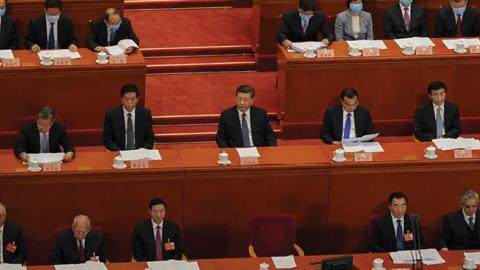Given President Trump’s behavior since the election, in particular encouraging his supporters’ assault on the U.S. Capitol, the incoming Biden administration understandably may be tempted to repudiate Trump’s policies. But a wholesale rejection would be a mistake. Elements of Trump’s policies toward China, for example, are eminently worth preserving.
Little noticed during a week when the House of Representatives voted for impeachment, the Trump administration released a partially declassified document from February 2018 entitled “U.S. Strategic Framework for the Indo-Pacific.” That document, and the collaborative work across the U.S. government during the year that preceded it, effected the most significant shift in U.S. foreign policy since the end of the Cold War.
The shift was long overdue, because U.S. policy between the end of the Cold War and 2017 was based on a flawed assumption: that China, having been welcomed into the international order, would play by the rules, and, as it prospered, would liberalize its economy and, ultimately, its form of governance.
Instead, the Chinese Communist Party pursued an increasingly aggressive agenda, exploiting the United States’ policy of cooperation and engagement. As national security adviser at the time, I was among those who worked on the policy underpinning the strategic framework. Foremost among our new, more-realistic assumptions about the CCP’s aims was our belief that “strategic competition between the United States and China will persist, owing to the divergent nature and goals of our political and economic systems.”
As China has continued its aggressive economic and military policies, the accuracy of that assessment has been confirmed. No doubt the Biden administration will see ways to improve the strategic framework we devised, but continuity with the approach is essential. President-elect Joe Biden’s policy advisers can strengthen the framework by correcting three common misunderstandings about it.
The first is that current Chinese aggression has resulted from U.S.-China tensions or is a response to the Trump administration’s description of China as a U.S. rival. That’s a misreading, resulting from strategic narcissism — an arrogant conceit that CCP leaders have no aspirations, no volition except in reaction to the United States. Even a cursory survey of recent CCP actions shows how mistaken that view is.
Consider China’s deliberate suppression of information about the coronavirus outbreak and its persecution of doctors and journalists who tried to warn the world. More recently, the CCP has tried to cast its response to the pandemic in a heroic light — even as Beijing inflicted economic punishment on Australia for having the temerity to propose an inquiry into the origins of the virus.
Externally, the Chinese military in the past year has bludgeoned Indian soldiers to death along the Himalayan frontier, rammed and sunk a Vietnamese fishing boat in the South China Sea, and menaced Taiwan with its aircraft and naval vessels. Internally, the CCP has raced to perfect its technologically enabled police state, extend its repression of Hong Kong’s beleaguered democratic movement and continue its campaign of cultural genocide against the Uighurs in Xinjiang.
The Biden administration should begin its China policy review by recognizing that the United States did not cause CCP aggression and that CCP aggression is not just a U.S. problem. The CCP is a threat to the free world: The choice for other nations is not between Washington and Beijing but between sovereignty and servitude.
The second misunderstanding is that the United States has eschewed international cooperation to counter CCP aggression in favor of an “America alone” approach. Yet the strategic framework cited alliances and partnerships as essential, with an emphasis on a “shared vision for a free and open Indo-Pacific.” Cooperation has grown since 2017, as can be seen in the invigoration of “the Quad” format (India, Japan, Australia and the United States), and growing law enforcement and intelligence cooperation against Chinese cyberwarfare and cyberespionage.
The third misunderstanding is that U.S. competition with China is dangerous or even irresponsible because of “Thucydides’s Trap,” a term coined to express the likelihood of conflict between a rising power (China) and an allegedly declining power (the United States). The CCP exploits perceptions of the trap by blaming the United States for trying to keep China down. Beijing isn’t aggressive in this fairy tale, it is simply standing up for the Chinese people.
The way for the United States to avoid the trap is neither to gravitate toward confrontation nor passive accommodation. Transparent competition, as described in the Indo-Pacific strategy, can prevent unnecessary escalation — and it can foster cooperation with China, not foreclose on it.
The Biden administration should be confident in the free world’s ability to compete effectively with the CCP and its authoritarian, mercantilist model. In the past year, the United States has been sorely tested by pandemic, recession, social division and political strife, but our republic has proved resilient. It is up to the task of working with partners to defend the free world from Chinese Communist Party aggression.
Read in The Washington Post

















